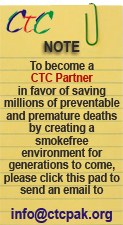Geneva,
Switzerland. Official
representatives of some 130
countries wrapped up talks in Geneva
today on a new treaty, the Illicit
Trade Protocol, to curb the
smuggling, counterfeiting, and
illicit manufacturing of tobacco
products. The Framework Convention
Alliance (FCA) – a group of over 300
civil society organizations –
congratulates the participants on
the spirit of cooperation that
enabled them to make progress this
week, but also urges them to
continue to keep their purpose and
common cause in mind as work on the
treaty continues and the death toll
from tobacco steadily increases.
“Illicit trade of tobacco products
undermines countries’ ability to
protect the health of their citizens
and deprives national coffers of
many billions of dollars of tax
revenue,” said Laurent Huber,
Executive Director of the FCA. “By
agreeing to move forward on all of
the key measures necessary to stop
these illegal activities, the
nations have made a promising start
in addressing an international
problem that requires international
cooperation to solve.”
A recent report from the World
Health Organization (WHO) predicted
that one billion people will die
from tobacco use this century unless
current trends are reversed. The WHO
also says that half the people that
smoke today, about 650 million
people, will eventually by killed by
tobacco.
At this week’s negotiations –
convened by the WHO – the FCA
recommended to the participating
nations that they retain important
measures for addressing the illicit
trade of tobacco products like
cigarettes in the evolving text of
the Protocol. These measures include
international cooperation on
investigation and prosecution of
illicit trade cases, systems for
tracking and tracing tobacco
products, criminalization and
increased penalties for illegal
activity, and enhanced law
enforcement.
The Protocol is being negotiated as
a subsidiary agreement to the WHO
Framework Convention on Tobacco
Control, the international tobacco
control treaty under which Parties
agree to implement proven measures
to address the rising global tobacco
epidemic.
Tobacco products available from
smuggling and counterfeiting
operations undermine nations’
legitimate efforts to raise the
price of these products. Raising
prices of tobacco products through
measures such as increased taxes is
the most effective means of helping
people to quit using them or keeping
them from starting. Illegal trade
also deprives national coffers of up
to US$50 billion per year in lost
tax revenue.
Earlier this week, the results of an
investigation into illicit trade in
the Balkan states were announced.
The investigation uncovered links
from the illicit trade of cigarettes
to corrupt public officials and
organized crime organizations.
Parties to the FCTC will meet at
least once more this year to move
forward in negotiations on the
Illicit Trade Protocol, with further
sessions planned before it is
finalized and adopted in late 2010.
The negotiating process for the
Protocol is being conducted under
the auspices of the WHO.
Mark Hurley, Framework Convention
Alliance, +1 202 460 2679 (in
Geneva)
Back on top
More on the same
GENEVA
(AP) - About 130 countries have
begun negotiations on a treaty to
fight large-scale tobacco smuggling,
which is blamed for encouraging
smoking, officials of the World
Health Organization said Friday.
An initial five-day meeting this
week helped present the scope of the
problem that is costing governments
billions of dollars in lost taxes
and undermines efforts to prevent
smoking-related diseases, said Ian
Walton-Georges, who chaired the
gathering under the auspices of WHO.
The sponsors hope to have a treaty
completed by 2010. It would be an
addition to an existing anti-smoking
treaty, the 2005 Framework
Convention on Tobacco Control, which
has 152 state signatories.
Walton-Georges said there was
widespread agreement that a new
legally binding treaty is needed,
but countries have to work out
details, including how to stop
smugglers from getting cigarettes
and how to impose tougher sanctions
against criminals.
But campaign organizations said an
exception was Japan, which insisted
that any treaty had to be in line
with existing international trade
agreements and could not go beyond
domestic laws.
Kathy Mulvey of Corporate
Accountability International, a
Boston-based campaign group, said
she suspected that the Japanese
position was related to the Japanese
government's 50 percent stake in
Japan Tobacco International, the
world's third largest international
tobacco maker.
Often "legally traded tobacco ... is
diverted into the illegal channels,"
Walton-Georges said.
Customs authorities seize large
amounts of smuggled cigarettes, but
it is mostly unclear who is behind
the smuggling and what transport
routes are used.
Illegal tobacco trade accounts for
about 10 percent of global tobacco
sales and costs governments between
US$40 billion (euro27 billion) and
US$50 billion (euro34 billion) in
lost tax revenue per year, according
to the Framework Convention
Alliance, a coalition of more than
300 campaign groups.
New rules should make tobacco
smuggling less attractive, said
campaigner Mulvey. "That would
include penalties for manufacturers
when they're shown being complicit
in this (illegal) trade," she said.
The European Anti-Fraud Office
estimates that one container load of
10 million cigarettes had an average
tax value of US$2 million in the
European Union last year.
Smuggled cigarettes are cheaper than
legal products on the market, giving
smokers less incentive to quit
smoking and encouraging young people
to start, campaign groups say.
The WHO in a report last week said
that 5.4 million people die every
year from lung cancer, heart
diseases and other illnesses
stemming from tobacco smoking. It
warned that the tobacco epidemic
could claim 1 billion lives by the
end of the century unless
governments dramatically step up
efforts to curb smoking.
Back on top
GENEVA, Feb 15 (Reuters) -
Nearly 130 countries have taken
the first steps towards a new
treaty to combat tobacco
smuggling, blamed for higher
consumption and up to $50
billion in lost tax revenues
each year, officials said on
Friday.
The officials, from several
international agencies, were
speaking after the first
negotiations under the World
Health Organisation (WHO). They
called for the pact to be ready
for adoption by 2010, adding
political will was needed.
They discussed a protocol to the
WHO international treaty on
tobacco control, which already
bans sales to minors and tobacco
advertising and sponsorship.
The United Nations agency
estimates 5 million people die
each year of tobacco-related
diseases.
Many countries said the new pact
should include a licensing
system for suppliers and
distributors, a "tracking and
tracing regime" to monitor
cigarettes through the supply
chain and stronger law
enforcement with stiff
penalties, officials said.
"We need a protocol that is
practical, effective and
strong," Ian Walton-Georges, who
chaired the weeklong talks, told
a final news conference. "A
start has been made and we will
ensure momentum will be
continued."
Further negotiations are
expected in October and in 2009
before a draft text is presented
in 2010 to the 152 countries
which have ratified the
Framework Convention on Tobacco
Control.
Tobacco smugglers divert
legally-traded cigarettes to
black markets in all countries,
especially rich ones, according
to Walton-Georges, who works at
the European Anti-Fraud Office.
"These are organised criminal
gangs whose profits from illicit
trade are ploughed into
money-laundering, VAT fraud and
other criminal activities," he
said.
"Countries of Europe are
particularly targeted because so
much money can be made there.
Last year in the European Union,
we probably lost 6 billion euros
or $9 billion, and that is what
we know about," he added.
Illicit trade in tobacco
products significantly
contributes to death and disease
caused by tobacco consumption
and to the rise in tobacco
consumption by making cigarettes
"cheaper, more accessible and
more difficult to regulate",
according to WHO.
Activists welcomed progress, but
insisted industry must be kept
from influencing the
negotiations and public health
policy.
Philip Morris/
Altria,
British American Tobacco and
Japan Tobacco were among
manufacturers closely following
the week-long talks, they said.
"Smugglers are now on notice
that their days of making vast
profits with little chance of
being caught, and if they are
caught they are given negligible
penalties, are coming to an
end," said Deborah Arnott, of
the Framework Convention
Alliance which links 300
non-governmental organisations
in 100 countries. (Editing by
Matthew Jones)
Back on top
GENEVA,
Feb 15, 2008 (AFP) -
The World Health Organisation
announced Friday that it planned
to adopt a new international
treaty on the illegal tobacco
trade by 2010.
"We have finally assessed that
we want a protocol on the
illicit trade of tobacco," Ian
Walton-George, the world health
body's top negotiator on the
issue, told a press conference
at Geneva.
The WHO has been meeting this
week at its headquarters in the
Swiss city to debate a new
protocol on the illicit tobacco
trade to tie in to its wider
Framework Convention on Tobacco
Control (FCTC).
"2010 is the date for finalising
negotiations and adopting the
text of the protocol," said Haik
Nikogosian, who heads the WHO's
anti-tobacco secretariat.
The illicit tobacco trade is
estimated to make up
approximately 10 percent of
global tobacco sales and costs
governments between 40 and 50
billion dollars (27-34 billion
euros) every year.
In African countries such as
Nigeria, its share is estimated
to be even higher at between 10
and 16 percent, lobby group
Corporate Accountability
International (CAI) said earlier
this week.
"Controlling this trade,
controlling the prices is
crucial to prevent young people
to use tabacco," Deborah Arnott,
European head of the Framework
Convention Alliance pressure
group, said Friday.
Campaigners alleged ahead of the
WHO meeting that tobacco giants
Philip Morris,
British American Tobacco and
Japan Tobacco actively
collude with cigarette smugglers
to gain a foothold in lucrative
developing markets.
"Transnationals benefit in a
number of ways from the illicit
trade in tobacco," said Kathyrn
Mulvey, CAI's director of
international policy.
This includes establishing a
brand presence in new markets,
and getting more people addicted
to cigarettes -- particularly
children because smuggled
tobacco is so cheap, she told
journalists on Wednesday.
"Documents do show industry
complicity in this deadly
business," Mulvey added.
The WHO said last week that
tobacco use could kill more than
one billion people around the
world this century unless
governments and civil society
act to reverse the epidemic.
The existing FCTC agreement,
signed in February 2005, aims to
rein in the estimated five
million annual deaths caused by
smoking, which the WHO says will
double by 2020 if nothing is
done.
Back on top




